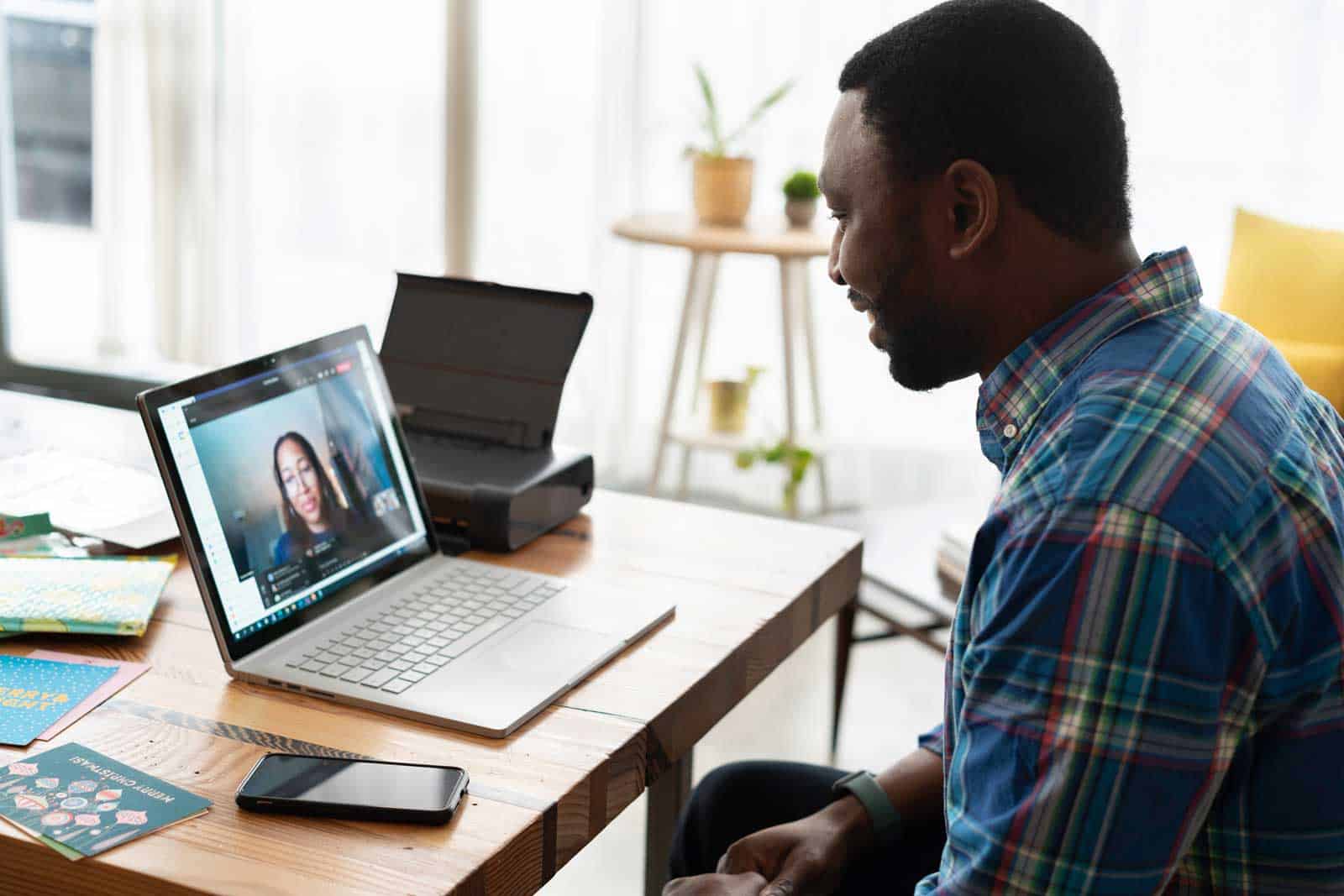Working from home has become a popular option for many professionals. It allows us to work flexible hours, set our own schedules, and even earn extra income. However, working from home also means we get less face time with co-workers and bosses. This may cause us to feel isolated and lonely.
Do you find yourself feeling lonely at work because you spend most of your day alone? Does working from home make you feel disconnected from your coworkers and boss? Then maybe it’s time to consider moving back to an office job.
No, working from home doesn’t make you lazy. But it can be lonely. And that’s not good for anyone. So if you’re feeling lazy and unmotivated there are are legitimate ways to deal with that and come out better, more productive and happier on the other side.
Real quick before we get too far into this: if you want to get more great ideas for your home office and connect with other home office hackers to make your space the best join my free private Facebook group, Home Office Hacks here.
Why do I feel so unmotivated working from home?

Working from home can be incredibly rewarding, but it can also be extremely difficult to maintain motivation levels. There are several reasons why working from home might lead to feelings of laziness.
Kristina Kasparian, PhD, points out there are multiple facets to motivation and these things can be amplified when you’re working from home.
“Motivation is a complex topic and research field. Emotional pressure and financial stress can impact motivation negatively, whereas a sense of purpose and employee autonomy (for creativity, experimentation) have a positive impact on motivation. The same factors that impact motivation in the workplace apply to working from home, but engagement / perceived value / sense of purpose becomes all the more important when working remotely.”
One reason could be that you’re spending less time interacting with other people. When you’re working outside of the office, you’re likely to spend less time talking and interacting with coworkers and customers. Working from home can sometimes feel isolating, especially if you’re the only person in the house.
It’s also possible that you’re feeling bored because you’re stuck inside all day. If you’re used to going to the gym after work, then working from home might seem boring. Or maybe you just aren’t motivated enough to get anything done.
It could also be a lack of privacy. You may not want your roommates or family members to be around when you’re working from home. This is particularly true if you have kids. It’s easy for them to distract you while you’re trying to focus on work.
The absence of structure and the discipline of commuting to the office every day can also contribute to feelings of boredom. Too much flexibility is bad for some people.
Finally, there’s always the possibility that you’re simply too busy at home. If you’re constantly doing things like cooking dinner, cleaning up, taking care of children, etc., then you may find yourself getting overwhelmed by the amount of work you need to do.
You may be asking: how can I overcome these challenges?
According to performance expert Dr. Haley Perlus, creating a regular routine similar to one you’d have if you were commuting to an office can be a huge help. “If you do not have a regular routine, it can be easy to find yourself overwhelmed and disorganized. It may be hard to set a schedule at home if you are inundated with distractions throughout the day. However, that is why a schedule is so important. A schedule doesn’t allow time for distractions. Remember to make a checklist of everything you need to complete, schedule regular breaks, time to exercise, and more.”
Another one of the best ways I’ve personally found to combat any of these issues is to set goals and deadlines. For example, you could decide that you’ll only work from home one day per week if you have the option to split time between home and the office. Adding variety by getting out of the house and going to a coffee shop or co-working space is a great way to break up the monotony that can sometimes be a part of working from home. That will give you something to look forward to each week.
You should also try to schedule regular breaks throughout the day. Take a walk, go for a run, read a book, or even take a nap. These small breaks will help you stay focused and energized.
You shouldn’t expect to be able to work from home full-time without experiencing any problems. However, if you follow the tips above, you should be able to manage your motivation levels and avoid becoming overly stressed out.
Whatever the case, try to avoid making excuses for yourself. Instead, set goals for yourself and focus on accomplishing them. Then make sure that you reward yourself when you reach your goal.
What is the hardest part about working from home?

Working from home can be challenging, especially when you’re used to having coworkers around. But, it can also be incredibly rewarding.
One thing that I love about working from home is that I’m able to spend more time with my family. Now, I never miss a chance to spend time with my daughter.
However, there are some huge challenges that come with working from home.
One very obvious challenge that many people faced at the onset of the pandemic was not having a dedicated office space where they could work from.
The hardest part about working from home is probably dealing with loneliness. There are days where I don’t see anyone. And, I know that this isn’t normal for most people.
Another challenge is managing your workload. You may find yourself being distracted by everything else that needs to be done around the house.
In addition, you may find your living situation as less than optimal for setting up a work from home space. If you don’t have space in your home, whether it’s an apartment with roommates, a house, or something else, having a dedicated work space is essential.
When these factors are missing or aren’t taken into consideration, working from home can become a real struggle.
What are the worst things about working remotely?

Working remotely is a little different than working from home.
When you’re working remotely it could mean that you’re working from a co-working space like WeWork, or it could be that you’re set up in a coffee shop while you’re traveling.
So the challenges that come with working remotely can be a little different than the ones you face when you’re working from home.
When it comes to working remotely privacy may be the biggest challenge. When you’re working from home, you can usually keep your office door closed. This means that no one will ever bother you unless they knock on the door first.
But, when you’re working remotely, it could be that you have to take an important call in a busy place which can lead to some awkward situations to say the least.
And you’re always at the mercy of the internet service providers wherever you’re at. If you need a high-speed connection to host a video call, or you need to move big files back and forth or even just browse the web, you are far more likely to run into problems when you’re working remotely with your internet connection.
Focus and motivation are two other major issues that arise when you’re working from remote locations.
If you’re not focused enough, you’ll end up wasting too much time doing things that don’t matter. On the flip side, if you’re too focused, you might get overwhelmed and burnout before you’ve even started.
You can miss out on team bonding events. When you work in an office environment, you usually have coworkers to hang out with after hours. Remote workers tend to spend less time interacting with each other outside of work.
You lose out on networking opportunities. While remote workers can meet face-to-face with colleagues, they typically are less able to attend industry conferences or trade shows.
You can miss out on mentorship opportunities. Many companies offer mentorship programs to help employees grow professionally. These programs provide guidance and feedback to help employees develop into leaders within their organization.
Why working from home is more stressful?

For many of us introverts working from home is actually a lot less stressful! But even then, there are still some challenges that come with working from home.
So what is it about working from home that makes things more feel more stressful?
One of the most obvious differences between working from home and working in an office is that you’re alone. You’re all by yourself. There’s nobody around to talk to, so you’re forced to communicate through text messages, emails, phone calls, etc.
This can be very isolating and lonely, and this is a very real problem. And isolation and feeling out of the loop can cause a lot of stress.
Lack of communication with your team can also cause stress. It’s easy for people who work together every day to become close friends. But when you’re working remotely you often feel isolated from your teammates.
It’s hard to know what everyone else is thinking. So it’s harder to understand how someone else feels about something. And this lack of understanding can lead to misunderstandings and arguments.
Without someone supervising you in the office and no one is telling you what you should be doing, you can easily fall behind schedule or you can feel like you’re out of touch with what’s going on.
I know for me that’s been a challenge. Not being able to see my colleagues face to face and feel the atmosphere of the office and not being able to “read the room”, feeling like I’m part of the team still can causes issues.
Another challenge that causes an enormous amount of stress is not having a dedicated work space or place where you can focus. If you’re working from home and you are not set up for success with your home office it can cause a ton of stress in addition to being distracting and frustrating.
And finally, working from home means you need to set aside time to do work. You can’t just hop online whenever you want to check email or browse social media.
So is it better to work from home or in an office?

“You can be lazy regardless of where you are working” says Jake Marmulstein, CEO of Groundbreaker.co. “It is all a matter of prioritizing and allowing distractions to come and go and not getting sucked into it.” So, where you’re doing to your work from is less an issue than your approach to getting work done. Marmulstein goes on to say, “I would always recommend that you time block and prioritize the difficult things first thing in the day, take a break every 90 minutes to 2 hours, and not be too hard on yourself if you failed to do everything. This way you are able to get things done while you keep your sanity.”
There are pros and cons to both options. While working from home can save money, it can also lead to less productivity. And while working in an office can provide structure and support, it can also be distracting and stressful.
Ultimately, the choice depends on your personal preferences and goals.
Do you prefer to focus on work or spend time with friends and family?
Are you looking for flexibility or do you need the rigor of routine that comes with an office job to keep you on task?
How much control do you want over your schedule?
To figure out whether working from home is right for you, consider these questions:
- Is the kind of work do you do better done in an office environment or can it be done remotely?
- Do you enjoy spending time with other people in your office?
- Are you comfortable working alone?
- Are you equipped to work at home alone?
- Do you have enough self-discipline to be productive working from home?
- Is your job flexible enough to allow you to work from home?
- Does your employer offer telecommuting benefits?
Generally speaking, introverts (like me) thrive working from home, while extroverts thrive in the office being around other people, but each person has their own unique set of needs.
Why do I feel so unmotivated working from home?

It’s easy to fall into bad habits while working from home, especially if you spend long hours without human contact. Make sure that you set boundaries with yourself, whether it’s limiting the amount of time you spend online or setting aside specific days each week for focused productivity.
It’s not uncommon to get cabin fever when you don’t leave the house often, so try to take breaks outside as often as possible.
If you find that you’re getting distracted by things like TV shows, movies, or even Facebook, try turning off notifications on your phone so you won’t be tempted to look at them during your break.
You may also benefit from scheduling regular meetings with coworkers or clients to stay connected.
In addition, when you’re working from home, you tend to move around less than you would than if you were in the office. And when you’re sedentary, not moving, not heading to the water cooler to fill your water bottle and chat with your colleagues along the way, that means you’re a lot less likely to be motivated when your blood isn’t flowing.
One of the biggest challenges of working from home is finding ways to motivate yourself. It can be hard to tell if you’re doing good work because you’re enjoying what you’re doing or because you’re just trying to avoid procrastination.
The best way to combat this problem is to create a daily checklist of tasks that you need to complete. i’ve mentioned my daily top 3 to-do items before and I highly recommend doing something like this. This will help you know exactly what you need to accomplish every day and give you something concrete to aim for.
Another great strategy is to use a timer app on your phone to remind you to stop checking emails and start focusing on your project.
What about my boss? Will they think I’m slacking off?
Working from home doesn’t mean that you are ignoring your responsibilities. To the contrary – studies show that you should be more efficient than ever!
Your boss might notice that you’re less responsive than if you were in the office, but he or she shouldn’t assume that you’re goofing off. You’ll still be expected to meet deadlines and deliver quality work.
So how can you combat this lack of motivation?
Some companies are getting really creative and incentivizing productivity.
“One great hack which our company follows is changing the work culture and developing the ‘Intrapreneur’ concept instead of using the employee concept” says Johannes Larsson, Founder & CEO of Financer.com. “This concept works with a performance-based bonus after the base pay. This habit keeps our intrapreneurs self-motivated. The better your department performs, the better your monthly payment will be.”
Larsson noticed that productivity declined on Fridays as his team was starting to check out mentally with the weekend on their minds, and important tasks were getting pushed to the following Monday so he found creative ways to increase performance and productivity. “This move is also highly realistic because we can’t keep our WFH workers accountable. We need some resort to keep them motivated & we chose the monetary incentive to motivate them not to be lazy!”
Why am I so tired after working from home?

We keep coming back to this point but lack of social interactions can be a huge reason why you feel so tired after working from home all day by yourself.
When you’re surrounded by coworkers and colleagues every day, it’s much easier to interact socially. Working from home can sometimes feel lonely, especially if you’re used to having daily interactions with others.
It can also be super easy to lose track of time. This can be a good thing and a bad thing.
You may spend hours head-down down cranking out work and not realize the day has passed by and feel a great sense of accomplishment. You can also waste hours browsing Facebook or watching Netflix instead of doing work that needs to be done.. These activities aren’t necessarily bad, but it’s important to set aside specific blocks of time each day to focus on work.
How do I motivate myself to work from home?

Working from home gives you a lot of freedom with your work hours, so if you need some help staying motivated create a daily schedule and stick to it. This will help you stay on track and make the most of your time.
It’s easy to fall into the trap of allowing work to consume your whole day. Before you know it, you’ve worked all day without taking a lunch break, going for a walk with the dog, or simply stretching your legs. There’s no one there to check if you want to grab lunch together since no one is at your desk.
You can boost your productivity by calculating how much time you’ll need to complete tasks, take breaks, and enjoy activities. You may also use this method to make sure you get the most out of each day and avoid burnout. Plus, if you stick to a plan, you’ll probably be more productive in general. So turn off Netflix and get to work!
A routine can be extremely helpful when you work from home and are struggling to stay motivated. self-discipline sometimes gets a bad reputation, but it’s actually a form of great strength.
Want to learn more? Click here to read 17 tips on how to stay motivated when working from home.
Is working remotely really worth it?

There’s no doubt that working remotely has its perks. You can say goodbye to your commute, you can take work with you wherever you go, and you can even work in your PJs if you’re feeling lazy. Or shorts and a t-shirt like I do most days.
But is it really worth it?
Let’s take a closer look.
First of all, there’s the issue of privacy. When you’re working in an office you don’t have roommates or family interfering with your work and, at least have your own cubicle or desk to buckle down and get work done. But when you’re working remotely, the refuge is substantially different. Your kitchen table or living room couch may end up being your office if you don’t have a dedicated home office space, and that can be a bit overwhelming for introverts who need some space to think.
Then there’s the issue of the internet. Unless you have a solid connection, working remotely can be a huge struggle. Conference calls become choppy, video meetings are interrupted by buffering, and forget about trying to get any actual work done – it’s impossible.
Finally, there’s the question of opportunity. Sure, working remotely gives you the flexibility to travel and work from anywhere in the world. But it also means that you’re not tied to one location, which can make it harder to advance in your career or find new opportunities.
But it has some amazing benefits too.
Working remotely lets you spend less time commuting, which can save you money and reduce stress. It also allows you flexibility with your hours, which can give you more control over your life.
In addition, remote workers tend to be more productive and happier than their office counterparts. They report higher levels of job satisfaction, less stress, and increased creativity.
So while working remotely isn’t always ideal, it can definitely be beneficial.
So while there are definitely some drawbacks to working remotely, they aren’t enough to outweigh the many benefits.
So is working remotely really worth it? It depends on your situation.
Working from home definitely has its benefits, but it also requires a bit of self-discipline.
Next Steps
Want to join others who are creating the most amazing home offices and get more tips, tricks and hacks on how to make your home office the best it can be?
Join my brand new free private Facebook group, Home Office Hacks to connect with other home office hackers to make your space the best!
